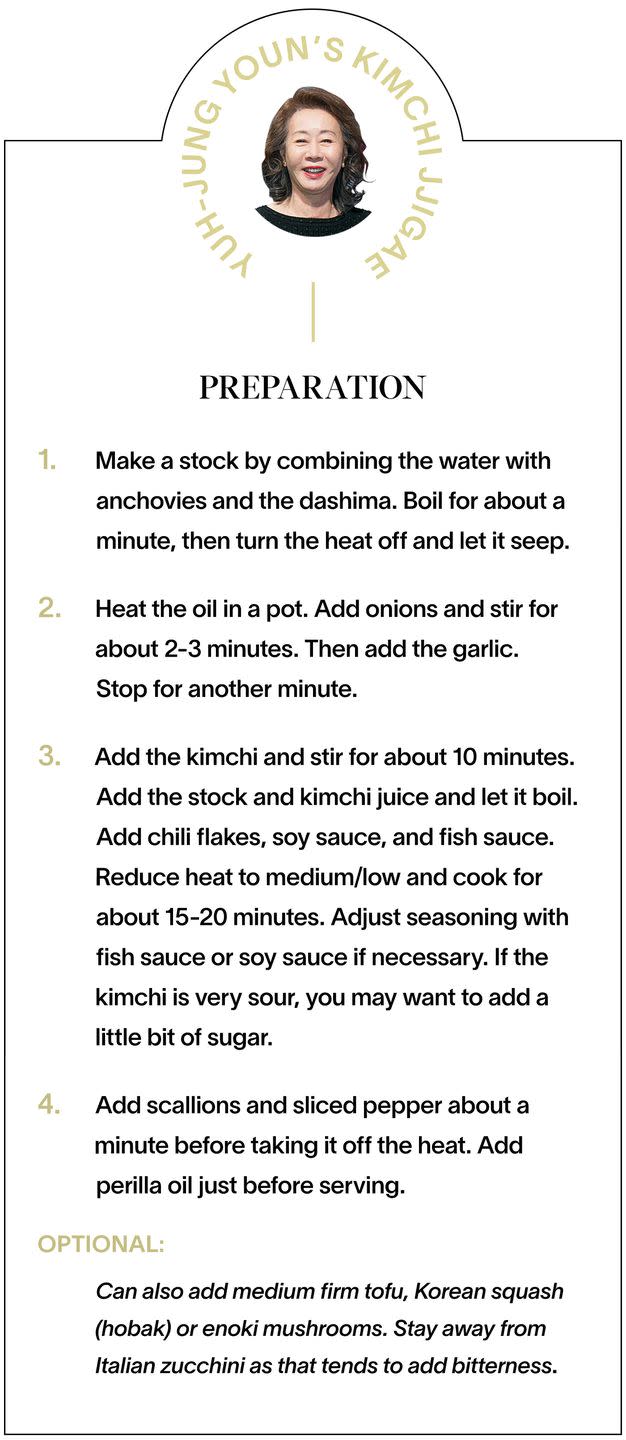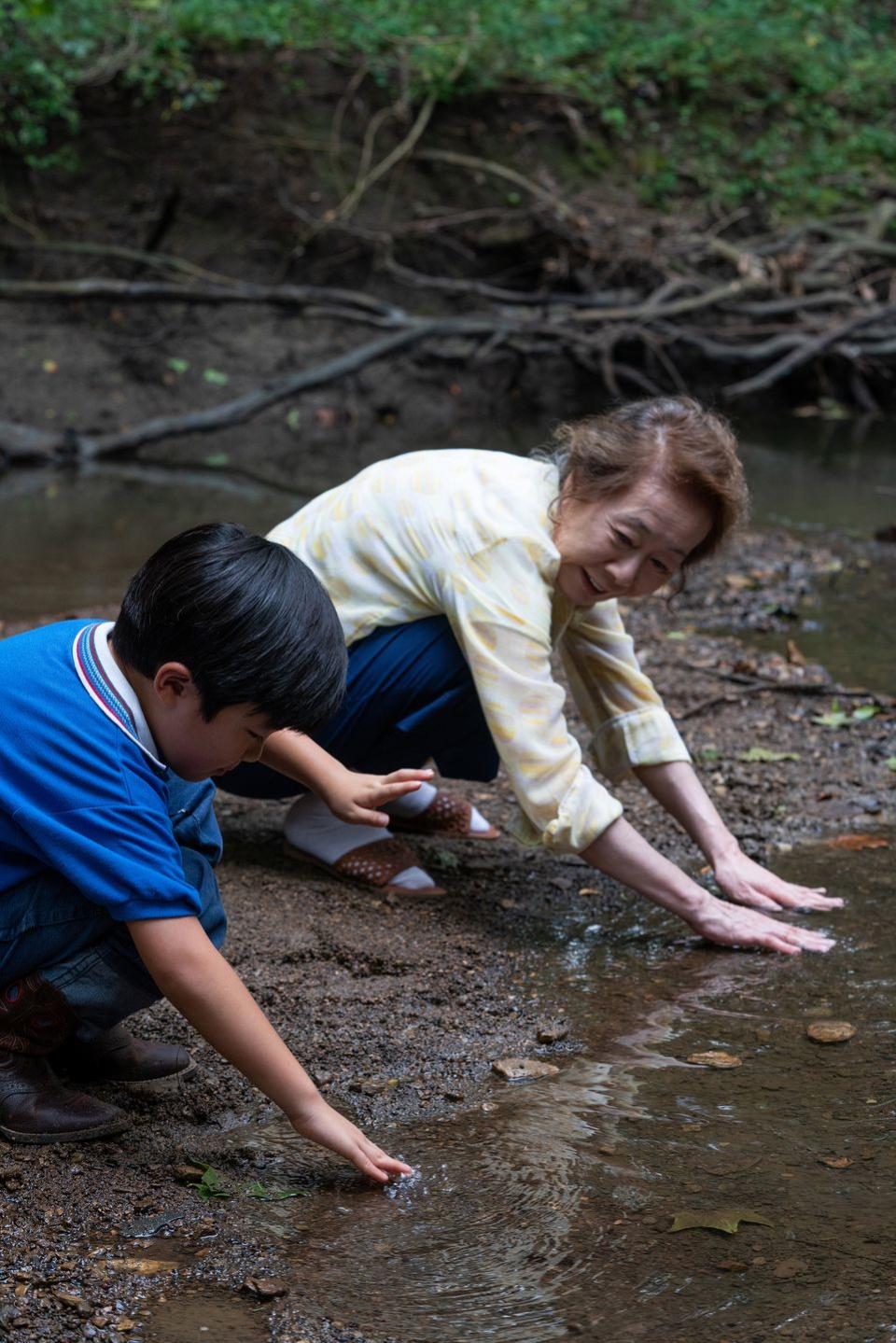My Dinner Date with Yuh-Jung Youn of 'Minari' and Her Kimchi Jjigae

I hold up my bowl of kimchi jjigae for (now Oscar-nominated) Yuh-jung Youn to assess, like a little kid showing off an art project. Over our February Zoom call, I figure it will be hard for her to see anything too specific about my first attempt at this Korean dish, but I wait with a smile anyway. The thing I quickly learn about Youn is that she is not going to go easy on me just because I threw some dried anchovies and kelp into a stew and called it revolutionary. “But…” she pauses for a second, “you just eat it alone without rice? You have to have some rice. It's too salty.” Level failed.
Youn is, in some ways, similar to the grandmother she plays in Minari, which garnered her a Academy Award nod for Best Supporting Actress. She does not mince words. She spends a solid 30 seconds making fun of my Southern accent. She doesn't describe herself as a cook, either. And yet, she knows the value of Korean chili peppers and a good kimchi recipe. Kimchi is the base of her recipe, which I've made today. Kimchi jjigae, from my Western perspective, is a lot like a soothing chicken soup you didn’t know you’d been missing out on. Dating back hundreds and hundreds of years, it’s a staple in Korea and made best with “ripe,” or rather old, kimchi, the kind that’s been hanging out in the fridge for a while. The recipe reminds me of a spin on “leftovers nights” everyone had as a kid, when mom pulled all the old tupperware from the fridge and assembled a meal.
But to call it a throwaway dish is far too flippant. Nothing about kimchi jjigae is offhand. Combining everything from dashima to fish sauce, a whole collection of robust flavors marry together in a sunset-colored stew, steeped in umami fishiness with an acidic tang on the backend. Get liberal with the chili peppers, and you’ll undoubtedly want a glass of water alongside it. But the star is the ripe, pungent kimchi. You almost want it to have gone off; that’s what gives the stew its kick. After talking with Youn though, I realize I will never taste her kimchi jjigae as she remembers it. That’s because kimchi, in its purest form, is a family secret—something particular to every Korean home. This recipe belongs to the Youns alone.
As she prepares for an awards season where she is favored to be an Oscar nominee for her charming yet devastating role as an unconventional Korean grandmother, Youn and I talked about Korean cuisine, why in God’s name she would star in her own reality TV show about running a kitchen, and how a piece of Korean identity is being erased with every mass-produced pallet of kimchi.
This interview has been edited and condensed for clarity.

Justin Kirkland: Thank you for being my dinner date tonight!
Yuh-jung Youn: Dinner date!
I've made your—I’m going to mess up the pronunciation—but I‘ve made your kimchi jjigae.
Sounds okay. I understood, so that's all that matters. You like spicy food, right?
I love spicy food.
Oh good, then it would be perfect for you.
It's a different kind of spicy than I'm used to, because I feel like I'm used to a good hot sauce, but this gets warm in the back of your throat. It's incredible.
Yeah, it's different. Different than just hot, like Mexican hot.
What's your history with this recipe?
Every Korean family has a very different style of this kimchi jjigae. Usually, we make our own kimchi. Every family has a different style of kimchi, but it's ... to you guys it may be similar. Through wintertime, we eat kimchi every meal, and so after we have leftover kimchi, we just make kimchi jjigae.
I was excited, because I was going through my fridge to figure out what I had and what I didn't, and I actually had some leftover kimchi.
Good.
I was reading that that's best, if it's a little bit old.
Mm-hmm.

Can you say what it is that's particular about your family's kimchi recipe?
My family actually are from the northern part of Korea, so they don't use much fish sauce in the northern part. South part of Korea, they use a lot of fish sauce. But nowadays, we’re all mixed up, you know. It was a long time ago. Nowadays, we don't make kimchi anymore. We just buy it at the grocery, like you do.
My time, like 50 years ago, it's just a big event for preparing winter meals, making kimchi with the whole family together. We salt the cabbage one day and after, we wash it thoroughly, then drain it and mix with special sauce. Every different family has a different sauce. Hot pepper and radish and garlic and some kind of—we call it shrimp sauce—a shrimp sauce, and everybody has it different. Then we marinate it, then all of the family together, trying just to put all that ingredient together and then put it in the big jar. And we just store it on the shelf, not the refrigerator. I'm talking about old times. But not anymore. We have a special refrigerator nowadays for the kimchi. I'm talking about very, very old-fashioned style. I'm an old-fashioned lady. Then we wait until the certain day, and then we eat every day, like leftovers.
Every family has a different taste of the kimchi. But nowadays, because you buy at the grocery store, it's all similar. That's the difference.
Do you get much time to cook with your schedule these days?
No, not really. I don't cook much.
I took in an episode of Youn’s Kitchen [a Korean reality TV show], and you said that you're not a cook, but I saw you flip some kimchi pancakes, and you seemed like you were doing fine.
Oh, because I grew up just watching it, my mother's doing it, so that, you know, I can do that. But yes, I don't cook.
What was the inspiration for Youn's Kitchen?
One producer—he’s very well-known in Korea doing reality shows—he had some kind of idea: All of the cast was all famous actors and actresses. And he had the idea to go overseas and have a Korean restaurant, to open the restaurant for the tourist area or whatever. It succeeded, so after that I'm just stuck with him now. Because they named it after me—Youn's Kitchen—so I cannot say I cannot do that anymore.

I know, you guys are in your third season. This season is set in Korea because of the pandemic. Have you missed the traveling aspect with everything going on?
When you go there with that program, you cannot travel. People say, "Why don't you stop in a certain place?" When we were in Garachico in Spain, there was some very, very famous architecture or something. People think we are on vacation or on tour. No, I was in the kitchen, whole day. So I [wasn’t] able to see it. I only see after the show was done and I was watching television and said, “Oh, there is the ocean. I didn't know.” Because we were back and forth to the AirBnb and then the restaurant. We had to prepare things, and we don't know how many people we'll get, so that was very, very…
Stressful?
Yes, very stressful.
Outside of kimchi, is there any other kind of South Korean go-to foods that might be a well-kept secret? Is there a snack you like to keep around?
You laugh at me. We make rice, and sometimes at the bottom of the pot, there's some brown part... the rice. And we call that nurungji. Just eat it like crispy cereal. So that's my favorite—not sweet or not spicy or nothing, but it's just browned rice actually. Nurungji is not burnt, I mean, you cannot eat burnt.
It's crispy enough, on the bottom.
Yes, yes, and it has to be brown. Not burnt. Brown.
This may sound strange, but is there a certain dish or a certain aspect of cuisine that you feel like the West doesn’t pay enough attention to?
Fish. Do you eat fish often?
Not as much as I should. I feel like we eat a ton of red meat, which can't be that good for you.
That's what I gathered, because most Caucasian people don't like to eat fish, but fish is good for your health, and we have a lot of fish dishes. Of course, it's just only salt and pepper, and then marinate the salt and pepper, and then just broil them. Or fry them with a little bit of flour. Or we can make jjigae like kimchi jjigae. We have fish jjigae. Most American I see don't eat many fish like we do.
You've had such an incredible career in your own right, before Minari. To have this crossover must be kind of bizarre, because you have a whole new audience finding you in a whole new way.
It's not real to me. This country is so big. [When I got the SAG nomination] they said, "You should appreciate this award, especially." So I said, "Okay, I understand now." I understand now.
It seems like Korean pop culture, whether it be cinema or music, is finally permeating over here in the States. Last year Parasite dominated the award circuit. I feel like you can't go anywhere in the music space and not hear about BTS at this point. Are you a BTS fan?
I'm 75, I don't know. The Beatles were that big, so they always compare. I don't understand them and they always say, "It's like Beatles your time, Beatles." So okay, well, I got it.
I'm so glad the world could notice that about Korea, because me, living in that country such a long time and in my time, nobody knew about South Korea. All they remember is the Korean War, so it was kind of, you know, shame—or it's not shame, but it's not a good memory about remembering that country. But I know, my people—the Korean people—are very talented. Especially singing. Everybody could sing, except me. I'm out of tune. Everybody is a singer. And now I think the world will recognize that, because of BTS and... what do you call that? Their calculated and almost acrobat dancing.
So I'm glad I am able to see the world recognize the Korean people's talent before I die.

In Minari, I love that even though your character doesn’t cook, she brings over bags of spices and food, which I think really speaks to the larger message in the film. How food, especially food from home, unites us.
Yes, she brought the hot pepper powder and dried anchovy, wasn't it? It's typical grandmother. My daughter [in the film] said, "Well, we can get the hot pepper from Texas or somewhere, but it's not the same like we have in Korea." The food is a kind of root from their family. It's only a mother [who] could make that special spice or food, so that's very true.
You lived in the States for a while. When you were stateside, did you have any moments like that, when all you wanted was a taste of home?
There was no Korean grocery store where I lived. I was living in St. Petersburg, Florida. Only me and my ex-husband, so we had to—there's some Oriental store. The man was just selling some kind of Japanese food and some Chinese grocery things, and it doesn't say an expiring date or nothing. I bought it and, oh, that was precious to me. I didn't care about the expiration date. Back in that time, when I was pregnant, I was craving food. I cried even. I wanted to eat something that I couldn't have, so I cried. I don't know how many days I cried. That was a really hard time.
Do you remember what it was from that store that you ended up finding?
Well, it's an Oriental store, and that Caucasian man, he said he was married [to a] Japanese lady. I don't know how he imported from Japan or somewhere. I [went] often and if there's something familiar with me, then I got it. And there's no comparison: [whether] this one was better than or fresher than this. There's no choice at all. I appreciated it though, that little store.

Join Esquire Select
Before I let you go, I want to thank you so much for being my dinner date tonight.
Oh, thank you so much.
I have one final question for you: Why this dish? Why is kimchi jjigae the one that says the most about who you are?
Kimchi is... it's like representing Korea. So with kimchi, you can make anything. Like you saw [with] the kimchi pancake with the flour. We do everything with the kimchi. Back in old times, there's no food, maybe. Or not many food. So we can try to use our brain on how to use the kimchi as a main recipe. Maybe that's why. And because I'm Northerner, from Korea. That's why I put the dried anchovy and the dried seaweed.
But some prefer to have pork. They slice the pork and then instead of the soup, the anchovy and the dashima, you can put pork meat. Then some men like it better than that sauce I have. You try it with the sliced pork and then have some ... What kind of pork would be nice? Pork belly?
Now you’re talking to my heart.
Slice it and then, yes, stir it with the kimchi.
You Might Also Like

